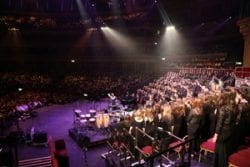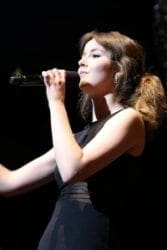- About Us
- Admissions
- Academic Life
- School Life
- Sixth Form


The department’s teaching team includes Director of Music, Katherine Bamber, Assistant Director of Music, David Southorn and classroom teachers, Matthew Salter and Dominique Jones. Working alongside them to support the co-curricular musical provision there are part-time Heads of Department as follows: Brass – Lance Kelly, Percussion – Rebecca McChrystal, Singing – Katrina Makepeace-Lott, Strings – James Widden, and Woodwind – Neil Crossley. There are also approximately eighteen visiting music teachers, offering weekly individual lessons on the full range of orchestral, jazz and pop instruments and singing. The department’s operations are supported by two Music Administrators, Samantha George and Suchitra Kothare.
Each year, Dame Alice Owen’s School admits 10 students into Year 7 on the strength of their musical aptitude. These students both benefit from, and are integral to, the rich musical community and tradition we all enjoy and of which we are so proud.
At Key Stage 3, students receive one curriculum Music lesson of one hour per week in reduced class sizes of about 20. The curriculum is practically-based, offering students the opportunity to develop their control and understanding of musical elements and styles through the interlinked activities of singing, rehearsing, performing, creating (including arranging, composing and improvising) and listening to music. Through the study of a range of musical topics, learners have the opportunity to continually refine and develop their skills, knowledge and understanding as they re-visit and encounter these musical elements and activities in different contexts.
The department is equipped with 3 teaching rooms, each with a range of ‘classroom instruments’, such as keyboards, tuned and untuned percussion, ukuleles and guitars. Students are also encouraged, where appropriate, to use their own instruments in their curriculum work. One of the rooms also has a set of networked computers with music software, offering both sequencing and notation capability. All of these offer a rich musical experience to all students in their KS3 Music curriculum. In addition, students are warmly encouraged to take up the numerous, wide-ranging co-curricular opportunities at Dame Alice Owen’s School that are designed to offer complementary musical activities that are exciting and accessible for all.
Music is a popular choice at GCSE (Eduqas board) and, during the course, students develop further their performing, composing and appraising skills.
A range of solo and ensemble performances throughout the course, with a free choice of repertoire, offer students the opportunity to take a more analytical approach to refining their work in this aspect.
The GCSE Music journey is often one where students develop and discover their own compositional voice, developing their technique and drawing on a range of stimuli, both taken from the syllabus Areas of Study and from the student’s own musical experience and interest.
They have the opportunity to make use of a range of notation and/or sequencing software to support their work in this area.
In the Appraising part of the course students develop their aural and theoretical understanding as well as the vocabulary used to describe and explain how music works.
Much of the learning is organised into 4 Areas of Study covering a range of styles, including various western classical genres, musical theatre, film music, Bhangra and various popular music styles.
GCSE Music students are expected to take an active role in the co-curricular musical life of the school and the experience they gain from this informs all aspects of their curriculum work.
Each year a significant proportion of Music students continue their studies to A-level, whether as a pre-cursor to pursuing it further at university or conservatoire, or as a complementary subject within their A-level choices. The department also regularly welcomes into the cohort students new to Owen’s in the sixth form.
In the A-level Music course (Eduqas) students extend and refine further their work in the areas of performing, composing and appraising, exploring each in more depth and adding more contextual understanding.
There is a significant focus on the western classical tradition, both through a study of the development of the symphony (1750-1900) within the Appraising part of the course, as well as within Composing, as students learn about the main features of composition from Baroque through to early Romantic. In a second area of study, students explore a period of significant stylistic change and innovation within classical music, such as at the turn of the nineteenth into the twentieth century, looking at Impressionism, Neo-classicism and Expressionism. A third area of study gives the opportunity to explore a more ‘popular’ style in some depth such as Jazz or Musical Theatre.
As performers, students work towards a short recital in the spring of Year 13. As composers, they both work to an exam board set brief within the western classical tradition, as well as being able to draw upon a free choice from a broad range of styles, allowing each student to follow their own musical interests and thus build on their strengths. In Year 13 students can decide whether to major in either performing or composition.
The department is also fully resourced to run Music Technology A-level.
Should they choose to do so, students are supported in their applications to either/both university and conservatoire, and each year there are students who follow each of these paths to institutions such as Cambridge, Manchester or Surrey (Tonmeister) universities as well as the Royal Academy of Music and the Guildhall School of Music.
A-level Music students play a key role in the co-curricular musical life of the school where there are numerous wide-ranging opportunities for ensemble and solo performances, as well as leadership and mentoring roles, in addition to developing their directing and rehearsing skills, as well as a platform for their creative output as composers and arrangers.
Each week, hundreds of Owen’s students come together in different groups to rehearse and to work towards our various ensembles concerts. There are at least 18 of these each year, often performing to sell-out audiences, covering a range of styles, genres and contexts, from Choral, Orchestral or Bands concerts, to Chamber concerts, to Soul or Jazz evenings or the Great Gig, as well as the annual musical theatre collaboration with the Drama department. In addition, our 5 Performance Platforms each term offer students a more intimate performing environment for solo performances.
We are very lucky to have an amazing dedicated 300-seater concert hall, with its banked stage and permanently set-up extensive percussion section. The school has been generously endowed with instruments over the years which, along with our fantastically adventurous and motivated students, enable us to tackle bold and exciting repertoire.
We offer our students a wide range of accessible, exciting and aspirational ensemble opportunities, including at least 5 choirs (3 auditioned), 6 orchestras, 6 bands of various types such as Concert Bands, Soul Bands, Big Bands, as well as numerous chamber groups, jazz combos and an Irish music group.
We are so lucky in the numbers of our motivated musician students that, during the pandemic year 2020-21, each year group was able to put on stage its own orchestra, choir and band, as well as various chamber groups, broadcasting a series of Owen’s Musicians Live@five performances.
In more normal times, Owen’s musicians also have multiple opportunities to perform outside of school. In recent years, the Dame Alice Owen’s Concert Band, Senior Strings, Close Harmony Group and Octet have taken part in the Regional and National Festivals of Music for Youth, both live and in the online 50th Anniversary celebration of 2020. The Senior Strings have also performed at the Schools’ Proms at the Royal Albert Hall. Chamber groups from all Key Stages have performed in the central London finals concert of the South East Schools’ Chamber Music Competition, as well as winning prizes in the Spring Grove Music Festival, along with Owen’s soloists and composers.


Each week, around 500 individual music lessons take place in the department’s 9 specialist rooms, covering all orchestral, jazz and pop instruments as well as singing. These reflect the full age and standard range, with beginners being as welcome as the advanced, diploma-level students. We are proud to be able to offer them excellent tuition from a team of outstanding Visiting Music Teachers. For students looking to take up a new instrument, we suggest they take a look at the introductory videos below that tell them about some less common instrument options they may not have considered.
Each term the school hosts 2-3 days of ABRSM examinations (the Associated Board of the Royal Schools of Music).
If your child would like to take lessons in school (Owen’s students), please contact the Music Administrators on [email protected]. sch.uk
Dame Alice Owen’s School
Dugdale Hill Lane
Potters Bar
Hertfordshire
EN6 2DU
01707 643441
[email protected]
Mon – Fri 8:00A.M. – 5:00P.M.